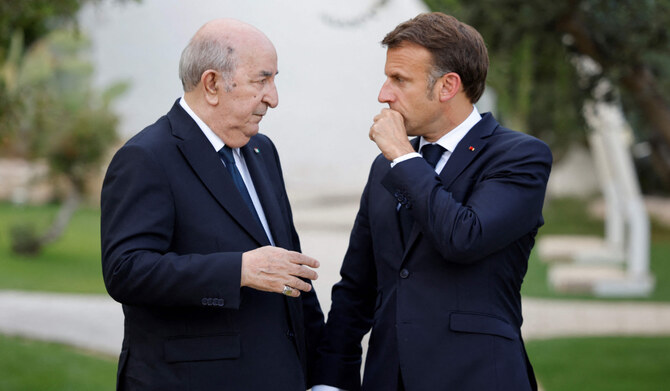ALGIERS: The fraught relations between France and its former colony Algeria had eased a little in recent years, but a new rift over Paris backing Morocco’s autonomy plan for disputed Western Sahara has sent rapprochement efforts into a tailspin.
Algerian President Abdelmadjid Tebboune, who is seeking a second term in presidential elections on September 7, was set to travel to France for a state visit, but this has been rescheduled twice and it is now doubtful in will happen at all.
Last month, Algiers withdrew its ambassador to Paris after French President Emmanuel Macron said Morocco’s autonomy plan was the only solution for the territory.
Algeria, which backs the territory’s pro-independence Polisario Front, denounced this as a “step that no other French government had taken before.”
France colonized Algeria in 1830 and the North African country only gained independence in 1962, after a war that authorities say killed more than 1.5 million Algerians.
French historians say half a million civilians and combatants died during the war for independence, 400,000 of them Algerian.
While France has made several attempts over the years to heal the wounds, it refuses to “apologize or repent” for the 132 years of often brutal rule that ended in the devastating eight-year war.
Experts now accuse both countries of exploiting the war for present-day political ends.
“The national narrative about the Algerian war is still dominant and during a campaign like the presidential election, Algerians are sensitive to these issues in their internal policy choices,” Hasni Abidi of the Geneva-based CERMAM Study Center told AFP.
Abidi said Tebboune now needed to “readjust his electoral speeches to protect himself from criticism on foreign policy” after the “complete fiasco” of failed attempts to restore relations with Macron.
Last week, Algeria marked its Moudjahid National Day commemorating war combattants with a speech by Tebboune, in which he said France wrongly “believed it could stifle the people’s revolution with iron and fire.”
In 2022, the two countries set up a joint commission of historians in an attempt to mend historical differences and appease tensions.
But, according to Abidi, the commission didn’t work fast enough and “did not succeed in freeing itself from political supervision.”
The expert said France’s latest move backing Morocco’s plan in Western Sahara “will deal another blow to the issue of memory” at the risk of “reopening old wounds and stigma from the colonial past.”
What followed France’s conquest of then Ottoman ruled Algiers was the destruction of its socio-economic structures, mass displacement, and the bloody repression of numerous revolts before the war erupted in 1954.
This chapter in the two countries’ history has been “exploited according to their issues and interests of the moment,” historian Hosni Kitouni told AFP.
During the historians’ debate, Algeria asked France to return the skulls of resistance fighters and historical and symbolic artifacts from 19th-century Algeria, including items that belonged to Algerian anti-colonial figure Emir Abdelkader.
“These items are in museums in France, where, from a legal standpoint, their presence is illegal,” Amira Zatir, an adviser at the Emir Abdelkader Foundation, told AFP.
She said many of these items were stolen when French forces looted the emir’s library during the Battle of Smala in 1843.
Algeria has also demanded the return of original archives from the Ottoman and colonial eras that were transferred to France before and after Algeria’s independence.
Algeria seeks reparations for actions committed by the former occupying power, such as the 17 nuclear tests conducted in its Sahara desert between 1960 and 1966.
Mustapha Boudina, a 92-year-old former war combattant who now heads the National Association of Former Death Row Inmates, said Algeria should require even more reparations.
“We need to put pressure on our enemies of the time so that they repent and apologize” for their “numerous crimes,” he said.
Several historians believe that recognizing French colonization as a “crime against humanity” would be more appropriate.
That was exactly how Macron described it during a visit to Algiers amid his presidential campaign in 2017, sparking an outcry from the French right.
























